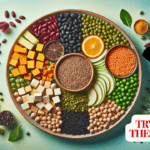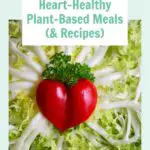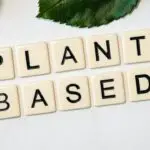A plant-based diet is a type of diet that emphasizes whole, minimally processed plant foods such as vegetables, fruits, legumes, grains, nuts, and seeds. It is typically low in saturated fat, cholesterol, and animal protein, and rich in nutrients such as fiber, antioxidants, and phytochemicals.
- The Different Plant-Based Diets
- Whole Food Plant-Based Diet
- Plant-Based Diet Benefits
- Plant-Based Diet Negatives
- Tips for Beginners
- Plant-Based Diet Foods
The Different Plant-Based Diets
Plant-based diets can include a variety of dietary patterns, including vegan, vegetarian, and flexitarian.
Vegan Diet
Vegan diets exclude all animal products, including meat, dairy, eggs, and honey. This means that the diet is entirely plant-based and does not include any animal-derived ingredients. Vegan diets can be rich in a variety of nutrients, including fiber, antioxidants, and phytochemicals, and may offer numerous health benefits.
Studies have shown that vegan diets can help to lower blood pressure, reduce the risk of heart disease, and improve blood sugar control.
(Learn more at What is a Vegan Diet?)
Vegetarian Diet
Vegetarian diets exclude meat, but may include dairy and eggs. Like vegan diets, vegetarian diets are primarily plant-based, but they may include small amounts of animal-derived products. There are several types of vegetarian diets, including lacto-vegetarian, which includes dairy products but excludes eggs, and ovo-vegetarian, which includes eggs but excludes dairy.
Vegetarian diets can also be rich in nutrients and offer numerous health benefits, including a lower risk of heart disease, type 2 diabetes, and certain types of cancer.
Flexitarian Diet
Flexitarian diets include both plant and animal foods, but the majority of the diet is plant-based. Flexitarian diets allow for more flexibility and can be tailored to individual needs and preferences. They may include small amounts of animal products such as meat, dairy, and eggs, but the focus is on plant-based foods.
Flexitarian diets can offer many of the same health benefits as vegan and vegetarian diets, but with the added option to include small amounts of animal products.
Whole Food Plant-Based Diet
A whole food plant-based diet is a type of dietary pattern that emphasizes the consumption of whole, minimally processed plant-based foods, such as fruits, vegetables, whole grains, legumes, nuts, and seeds. This type of diet does not include animal products, such as meat, poultry, fish, dairy, or eggs, and may provide a range of potential health benefits, including weight management, improved heart health, diabetes management, and cancer prevention.
Plant-Based Diet Benefits
There are numerous health benefits associated with plant-based diets. One of the main advantages is that they are rich in fiber, which is important for maintaining healthy digestion and preventing constipation.
Plant-based diets are also typically high in antioxidants, which are compounds that help protect against chronic diseases such as cancer and heart disease. Antioxidants are found in a variety of plant foods, including fruits, vegetables, nuts, and whole grains.
Plant-based diets are also typically low in saturated fat and cholesterol. Saturated fat and cholesterol are found in animal products such as meat and dairy, and they have been linked to an increased risk of heart disease. By replacing these animal products with plant-based alternatives, such as beans, nuts, and whole grains, it is possible to lower the intake of saturated fat and cholesterol and improve heart health.
In addition to the health benefits, there are also environmental benefits to following a plant-based diet. Livestock production is a major contributor to greenhouse gas emissions and deforestation. It requires more land, water, and resources to produce animal protein compared to plant protein. By reducing the consumption of animal products and increasing the intake of plant-based foods, it is possible to reduce the environmental impact of the diet. (See more at 6 Benefits of a Plant-Based Diet)
However, it is important to be mindful of nutrient adequacy when following a plant-based diet. Some nutrients, such as vitamin B12 and omega-3 fatty acids, are primarily found in animal products and may need to be supplemented.
It is also important to include a variety of plant foods in the diet to ensure adequate intake of all essential nutrients. Legumes, grains, nuts, seeds, and vegetables should be included in the diet to provide a range of nutrients, including protein, iron, calcium, and zinc.
Plant-Based Diet Negatives
While a plant-based diet can be a healthy and sustainable way of eating, there are a few potential negatives to consider.
One potential negative of a plant-based diet is that it may be more difficult to meet certain nutrient needs, particularly if the diet is not well-planned. For example, vegans may need to pay attention to getting enough protein, vitamin B12, and omega-3 fatty acids, as these nutrients are more commonly found in animal products. It may be necessary to include fortified foods or supplements in the diet to ensure that these nutrient needs are met.
Another potential negative of a plant-based diet is that it may be more challenging to eat out or dine with others. Many restaurant and social settings may not have a wide variety of plant-based options, which can make it more difficult to follow a plant-based diet in these situations. It may be necessary to plan ahead and make special requests when dining out to ensure that there are suitable plant-based options available.
It’s also important to note that not all plant-based foods are healthy. Processed and refined plant-based foods, such as chips, cookies, and sugary drinks, can be high in added sugars and unhealthy fats and should be limited in the diet.
Overall, while a plant-based diet can be a healthy and sustainable way of eating, it’s important to plan ahead and pay attention to nutrient needs to ensure that the diet is well-balanced. It may also be necessary to be mindful of dining out and social situations to ensure that there are suitable plant-based options available.
Tips for Beginners
If you’re interested in incorporating a plant-based diet into your lifestyle, here are some tips to get started:
- Make a plan: Decide what type of plant-based diet you want to follow. Some options include a vegetarian diet, which excludes meat but may include dairy and eggs; a vegan diet, which excludes all animal products; or a whole-foods, plant-based diet, which focuses on whole, unprocessed plant foods.
- Incorporate a variety of plant-based foods: A plant-based diet should include a variety of whole, unprocessed plant foods such as fruits, vegetables, whole grains, legumes, nuts, and seeds. These foods provide essential nutrients and can help you meet your energy needs.
- Experiment with plant-based protein sources: Plant-based protein sources include legumes (such as beans, lentils, and chickpeas), nuts, seeds, and soy products (such as tofu and tempeh). Try incorporating these foods into your meals and snacks to help meet your protein needs.
- Learn to cook plant-based meals: Cooking at home allows you to control the ingredients in your meals and can make it easier to follow a plant-based diet. Start by trying out simple, plant-based recipes and gradually build your cooking skills.
- Be mindful of nutrient needs: While a plant-based diet can provide all the nutrients you need, it’s important to pay attention to specific nutrient needs. For example, vegans may need to supplement with vitamin B12, and those following a whole-foods, plant-based diet may need to pay attention to getting enough iron and zinc.
- Seek support: Making the transition to a plant-based diet can be easier with the support of friends, family, or a healthcare provider. Consider joining a plant-based community or working with a registered dietitian to ensure that your dietary needs are being met.
Overall, incorporating a plant-based diet can be a healthy and sustainable way of eating. It’s important to plan ahead, be mindful of nutrient needs, and seek support as needed to ensure that your dietary needs are being met.
Plant-Based Diet Foods
There are many different types of plant-based diets, including vegetarian, vegan, and whole-foods, plant-based diets. A vegetarian diet excludes meat, but may include dairy and eggs. A vegan diet excludes all animal products, including dairy, eggs, and honey. A whole-foods, plant-based diet focuses on whole, unprocessed plant foods and may exclude or minimize processed and refined foods.
Plant-based diets can be rich in a variety of nutrients, including fiber, antioxidants, and phytochemicals, which may help reduce the risk of chronic diseases. They can also be a sustainable choice for the environment, as the production of plant-based foods typically requires fewer resources and generates fewer greenhouse gas emissions compared to animal-based foods.
Plant-Based Foods List
Here is a list of some common plant-based foods that you can include in your diet:
- Fruits: Fruits are a good source of vitamins, minerals, and fiber. They can be eaten fresh, frozen, or dried, and can be enjoyed as a snack or added to meals and desserts. Some good options include apples, bananas, berries, citrus fruits, mangoes, melons, and pears.
- Vegetables: Vegetables are a good source of vitamins, minerals, and fiber. They can be eaten raw, cooked, or roasted, and can be enjoyed as a snack or added to meals. Leafy greens such as spinach, kale, and collard greens; cruciferous vegetables such as broccoli, cabbage, and cauliflower; and root vegetables such as carrots, beets, and sweet potatoes are all excellent choices.
- Whole grains: Whole grains are a good source of complex carbohydrates, fiber, and various nutrients. They can be eaten as a standalone food or used in a variety of dishes such as cereals, breads, pastas, and rice dishes. Some good options include oats, quinoa, brown rice, whole wheat, and barley.
- Legumes: Legumes are a good source of plant-based protein, fiber, and various nutrients. They can be eaten as a standalone food or used in a variety of dishes such as soups, stews, and salads. Some good options include beans, lentils, and chickpeas.
- Nuts and seeds: Nuts and seeds are a good source of plant-based protein, healthy fats, and various nutrients. They can be eaten as a snack or added to meals and desserts. Some good options include almonds, walnuts, chia seeds, and flax seeds.
- Soy products: Soy products are a good source of plant-based protein and various nutrients. They can be eaten as a standalone food or used in a variety of dishes such as stir-fries, soups, and tofu scrambles. Some good options include tofu, tempeh, and edamame.
- Plant-based milks: Plant-based milks are a good alternative to dairy milk for those following a vegan diet or who are lactose intolerant. They can be used in a variety of dishes such as cereals, smoothies, and baked goods. Some good options include almond milk, soy milk, and oat milk.
- Plant-based oils: Plant-based oils are a good source of healthy fats and can be used in cooking, baking, and as a condiment
Incorporating a variety of plant-based foods into your diet can help you meet your nutritional needs and may offer numerous health benefits. It’s important to choose whole, unprocessed plant foods whenever possible and to pay attention to specific nutrient needs, such as protein and certain vitamins and minerals, if you are following a vegan or whole-foods, plant-based diet.
Lance has been passionate about the plant-based diet and we have been following a whole food plant-based diet for over 5 years. We focus on health, natural healing, weight management, animal rights, and the health of the planet and environment by focusing on whole plant-based foods and sustainable practices.
Learn more at the About Me page and follow on social media at the links below.






